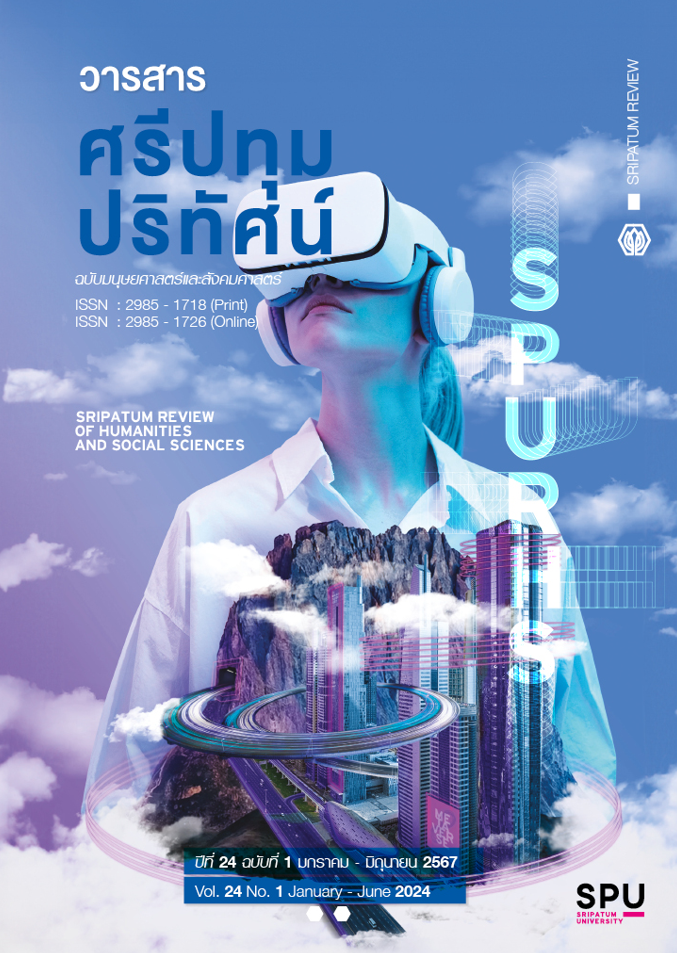Causal Factors of Destination Branding Affecting the Traveler Satisfaction in Thailand World Heritage Sites
Main Article Content
Abstract
The objectives of this paper are to (1) study the causal factors affecting destination branding and traveler satisfaction in Thailand’s World Heritage Sites, (2) study the influence of causal factors affecting destination branding and traveler satisfaction in Thailand’s World Heritage Sites, and (3) create a model of the causal factors affecting destination branding and traveler satisfaction in Thailand’s World Heritage Sites. The sample consisted of 416 travelers in World Heritage Sites of Thailand. Data were collected using a questionnaire. It is an evaluative question using a 5-point Likert’s Scale. The study found that (1) the causal factors affecting destination branding and traveler satisfaction in Thailand’s World Heritage Sites were at a high level in all 3 factors: destination management, destination marketing, and destination competitiveness, (2) The influence paths are consistent with empirical data. The factors can explain 52 percent of destination branding and 81 percent of traveler satisfaction, (3) The theoretical model of the causal factors affecting destination branding and traveler satisfaction in Thailand’s World Heritage Sites is consistent with empirical data. However, the destination marketing has a direct negative influence on destination branding and traveler satisfaction. Travelers value their travel experiences. Marketing strategies or operations in World Heritage sites are not traveler activities.
Article Details

This work is licensed under a Creative Commons Attribution-NonCommercial-NoDerivatives 4.0 International License.
1. กองบรรณาธิการสงวนสิทธิ์ในการพิจารณาและตัดสินการตีพิมพ์บทความในวารสาร
2. บทความทุกเรื่องจะได้รับการตรวจสอบทางวิชาการโดยผู้ทรงคุณวุฒิ แต่ข้อความและเนื้อหาในบทความที่ตีพิมพ์เป็นความรับผิดชอบของผู้เขียนแต่เพียงผู้เดียว มิใช่ความคิดเห็นและความรับผิดชอบของมหาวิทยาลัยศรีปทุม
3. การคัดลอกอ้างอิงต้องดำเนินการตามการปฏิบัติในหมู่นักวิชาการโดยทั่วไป และสอดคล้องกับกฎหมายที่เกี่ยวข้อง
References
Angsuchoti. S, Wijitwanna. S., & Pinyopanuwa, R. (2011). Statistical analysis for social and behavioral science research: techniques for using the LISREL program. Bangkok: CDMK Printing. (in Thai)
Ariestyani, K., & Utami, A.B. (2022). The Heart Beat of Toba: A Storynomics of Super-priority Tourism Destination Branding in the New Normal Era. Tourism and Sustainable Development Review, 3(1), 91-104.
Chin, C.H., Lo, M.C., Nair, V., & Songan, P. (2016). Examining the Effects of Environmental Components on Tourism Destination Competitiveness: The Moderating Impact of Community Support. Asian Academy of Management Journal, 21(1), 75–104.
Dias, A.L., Silva, S., Patuleia, M., Esteˆv~aom J., Gonza´lez-Rodrıguez, M.R. (2021). Selecting lifestyle entrepreneurship recovery strategies: A response to the COVID-19 pandemic. Tourism & Hospitality Research, 0(0), 1–7.
Djeria, L., Stamenkovića, P., Blešića, I., Milićevićb, S., & Ivkova, M. (2018). An importance-performance analysis of destination competitiveness factors: case of Jablanica district in Serbia. Economic Research-Ekonomska Istraživanja, 31(1), 811–826.
Kariyapol, T. (2023). Perspective of taxi drivers as a service provider to promote the image of Thailand after COVID-19: a case study in Don Mueang Bangkok, Thailand. Sripatum Review of Humanities and Social Sciences, 23(2), 40-52.
Kariyapol, T. & U-on, V. (2021). Modeling of Destination Branding Affecting Customer Performance in Thailand. the 8th Regional Conference on Graduate Research 2021, 8 August, 83-95.
Kotíková, S., & Pavlů, K. (2019). Destination management level evaluation with an emphasis on the internationalisation factor. Business and Economic Horizons, 15(3), 357-374.
Kovačić, S., Jovanović, T., Vujičić, M.D., Morrison, A.M., & Kennell, J. (2022). What Shapes Activity Preferences? The Role of Tourist Personality, Destination Personality and Destination Image: Evidence from Serbia. Sustainability, 14(1803), 1-22.
Lakmal, H.M. (2019). The Impact of an Identity Based Destination Image on Destination Loyalty: with Special Reference to Sri Lanka as a Tourist Destination. Sri Lankan Journal of Management, 24(2), 2-29.
Monica, F., & Olimpia, B. (2020). Theoretical Framework about Tourism Destination Competitiveness. Economic Sciences, 1, 32-38.
Ratliff, J., & Kunz, M.B. (2020). Key Components of Tourism Destination Development. Journal of Marketing Development and Competitiveness, 14(1), 48-56.
Sheehan, L., Vargas-Sanchez, A., & Abbate, T. (2016). The Use of Intelligence in Tourism Destination Management: An Emerging Role for DMOs. International Journal of Tourism Research, 18, 549–557.
UNWTO. (2022). World Heritage Convention States Parties Thailand. Available from: https://whc.unesco.org/en/statesparties/th/ [Accessed 30 May 2022].
UNWTO. (2023). World Heritage Convention States Parties Thailand. Available from: https://whc.unesco.org/en/statesparties/th/ [Accessed 23 November 2023].


